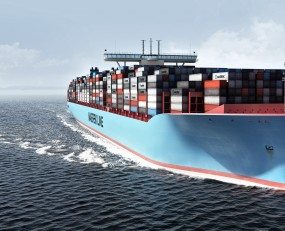
Maersk has issued an advisory note to its clients addressing what might be called the friction around the container shipping sector. Such notes are not unprecedented but this one highlights the stresses that the container market is seeing at present.
The first issue that Maersk discusses is the heated question of blanked sailings. The Copenhagen-based shipping line says that it has “reinstated the Transpacific Eastbound services that we had structurally blanked in Q2 (TP8 & TP11) due to decreased demand resulting from the global pandemic. For Golden Week holiday, we are planning fewer blank sailings than previous years”. This is interesting, as it is not the Asia -Europe route that has seen particular tightening of rates where the new capacity is being added, rather it is transpacific routes fuelled by demand in the US economy.
The note then goes on to mention the problems at several ports, notably, west coast ports of Vancouver, Prince Rupert and Los Angeles. These are struggling with the volumes as “ongoing influx of import volumes has maximised terminal yard utilisations in container yards in Prince Rupert and Vancouver – and often exceeds infrastructure limits”, whilst the familiar truck availability problems continue in Los Angeles, including chassis shortages. Rail “performance” into these ports seems to be coping, although both the Canadian ports are “experiencing heavy volumes every week”.
Another continuing problem is the availability of containers. Maersk refers to this saying that “equipment flows this year from Asia have been very one-sided with import flows [being] the dominant player”. Container maldistribution can cripple ports for short periods and even affect operations inland so this may add to problems moving into the peak season.
What these continuing areas of friction illustrate is that demand out of the US is healthier than that out of Europe and that capacity is barely keeping up. Despite Maersk’s move on blank sailings, it is indicative that the newfound discipline of the consolidated shipping sector continues to exploit the situation. Indeed, Maersk’s moderation may suggest that the situation in certain areas may get worse.
Source: Transport Intelligence, September 22, 2020
Author: Thomas Cullen